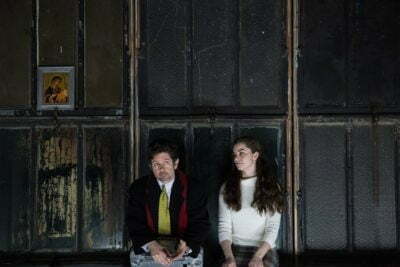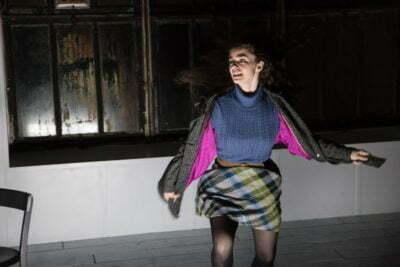Gentle
Adapted by Zeljko Djukic,
from F.M. Dostoevsky’s “The Meek One.”
Directed by Zeljko Djukic.
Produced by TUTA Theatre.
Playing at The Den Theatre, Chicago.
“I understand it all!” the Pawnbroker.
An Exceptional Production.
After almost a year since their last production, TUTA Theatre is back with an adaptation of 19th century Russian writer Dostoevsky’s short story, “The Meek One.” Exhibiting the style, intelligence, and sophistication fans of this company have come to expect, TUTA’s Gentle is an intimate examination of the modern soul in the form of a character study. The only disappointment in seeing this show is the awareness that TUTA’s theater model—quality over quantity, as I see it— may disqualifies it from Jeff Award consideration. Fortunately, the craft of great art is an honor unto itself for this talented group, and the reward is all our own, for we who get to witness it.

Directed and adapted by Zeljko Djukic, Gentle is a kind of rambling ratiocination on the part of the protagonist, the Pawnbroker (Tom Dacey Carr), to come to some understanding of his young wife’s recent suicide—so recent that her body still lies upon the table, awaiting its coffin. Talking aloud to no one—us, his audience, his judges—the Pawnbroker recounts how he first met the Girl (Dani Tucker), a poor, young Russian immigrant of less than 18 years, and how the naïve and meek magnanimity of her soul gradually led him to take notice of her—and eventually marry her. Little did she know what she was in for.
The Girl enters his home filled with humble, youthful exuberance, eager to share with the Pawnbroker stories of her life and to help him run his business. Paradoxically, however—and the word “paradox” is well chosen for this self-acclaimed enigmatic man—everything he admired in her he now seems bent on crushing in her spirit. “Who is this man?” the Girl’s mute looks inquire with a curious smile.
By today’s psychological and social standards the Pawnbroker is—a narcissist—a misogynist—a cruel and autocratic husband! To Dostoevsky—perhaps the same. But there is something more to him, Dostoevsky shows us, as he compassionately winds us through the inchoate abyss of his modern soul—a soul modern psychology and sociology has since imperialized like topographers with signs and calculations and categories. He is, in fact—of all things—a romantic idealist, yet one whose idealism constantly struggles against a strange and contradictory pragmatism: indeed, he is an irreducible enigma, even unto himself. The outcome of this inner struggle is utter irrationality and, as Dramaturge Evan Hill points out in his insightful playbill notes, a flattening of “the moral complexity of mankind,” until the humanity of others becomes nothing more than a one-dimensional variable without will or inner life.

Gentle shows us the tragic-comedic effect of this combination of idealism and pragmatism. The stern discipline the Pawnbroker enforces through his willful silence is intended to grant the Girl breadth of perspective—so broad, he aims, that she, of all people, will finally discern the noble suffering hidden within his pawnbroker’s case. The problem with the system he seeks to impose upon their relations is that human beings, by their nature, defy logical systems—and he most of all! Shortly after he imposes all these strictures on their marriage—a set daily allowance; an end to all theatre-going; a command that she may not leave the house without him—he himself loosens these very bonds by increasing their allowance, taking her to the theatre once a month, and letting her go where she pleases without inquiry!
Where she does go, however, is to meet with one of the Pawnbroker’s former associates, a rival of his. He spies on their meeting (a tryst) and interprets her coy wit as defiance of the man’s crude advances. She’s doing this only from an impulsive hatred of me, he thinks, to get back at me! And she, so noble, so lofty in the face of vice! The Pawnbroker confronts her (silently), and in the night she tries to kill him. To demonstrate his courage and to challenge her virtue, he submits to his death—and he wins, so to speak: her resolve falters and she becomes sick with remorse over her intention. But the rift between them grows wider, and from now on, she will live a separate life under his roof.

All the while this is happening, the Pawnbroker is none the wiser to his own failing scheme (he himself doesn’t even remember why they started with their imposed silence!). And then, for us at least, comes the moment of clarity—brilliantly directed by Djukic and stunningly executed by Tucker. The Pawnbroker, stirred to ecstasy at the Girl’s singing—an act he bizarrely takes as her utter forgetfulness of him—falls at her feet, kisses her feet, kisses the hem of her dress, confesses openly his love and admiration for her, and promises to give away his money and move with her to the Gulf. But, ah!, all this laud, all this lavish praise for her virtue—for her defiance of his rival’s advances—the Girl’s smile rises hopefully—then falls under her awareness and devastating guilt: the Pawnbroker has never known her at all.
TUTA’s production of Gentle lives up to their mission and history—sophisticated and intelligent. Director Djukic demonstrates a keen and brilliant eye for drama in adapting this story for the stage while preserving its complexities and narrative form.

Never before has the sentiment been so true that Chicago is fortunate to have the talent it has. Dani Tucker, a recent Chicago transplant and graduate from Mizzou, is breathtaking in her performance as the Girl. With so few lines, the ardent gaze of her eyes, the inclination of her body, the expression of her face—her very receptive presence—communicate as much, if not more, than the Pawnbroker’s incessant rattle. Yet, Tom Dacey Carr, I think has the greater challenge: to embody the internal paradox of the Pawnbroker, one of Dostoevsky’s notorious “underground” men. I had my doubts that it could be done, but, in short, it was—and to great effect.
A more sophisticated and honest adaptation of a great work of literature to the stage is, I think, rarely to be found. Those familiar with Dostoevsky and his work will relish TUTA’s production of Gentle a great delight that may in fact elucidate some of Dostoevsky’s more tortuously hidden themes. Those unfamiliar with either Dostoevsky or TUTA ought take advantage of this rare sighting. The production demands a great deal of attention, but the payoff—a sober, emotional grounding and enough food for thought to fast from theater for a year—is well worth the challenge.
Highly Recommended.
August Lysy.
Reviewed on 23 February 2017.
Playing at The Den Theatre, 1333 N Milwaukee Ave., Chicago. Tickets range from $25-$40 for adults and $20-$35 for students/seniors. For tickets and information, call Brown Paper Tickets at 1-800-838-3006, or visit BrownPaperTickets.com. Performances are Thursday thru Saturday at 7:30 p.m., and Sundays at 3:00 p.m. through March 26th. Running time is 90 minutes with no intermission.

